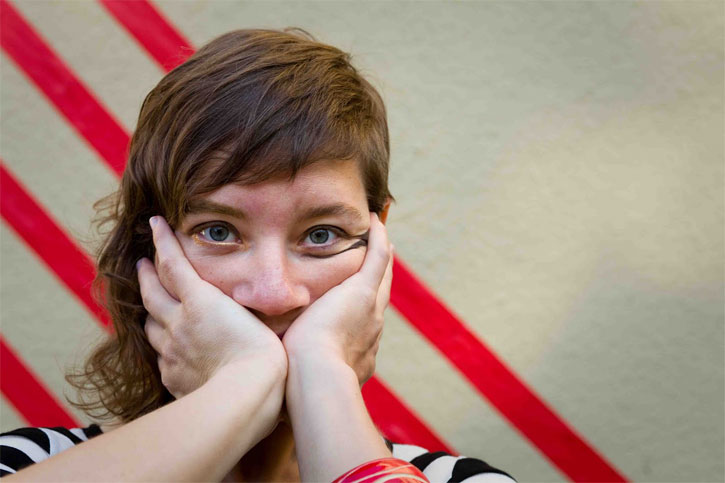
To put it concisely, Garbus is a helluva woman. Armed with a ukelele, free music editing software, and a digital recorder to capture samples with, Garbus created the lo-fi BiRd-BrAiNs in as DIY a manner as possible. She channeled the hopelessness from a particularly low point of her life into an experimental album – one which feels positive in its instrumentation but has hints of cynicism in its lyrical content. The album is chock full of rhetorical questions — hypothetical what-ifs one might ask when questioning oneself.
“At a certain point in my mid-20s, I hit real rock bottom — I mean, in terms of, feeling I wanted to exist on the planet. When I realized that if the choice was between dying versus doing something that made me want to live and made me want to be a part of the world, that was the obvious choice,” explains Garbus. “And I guess through my music, I found that.”
Listen to “Hatari” – DOWNLOAD MP3
“When I realized that if the choice was between dying versus doing something that made me want to live and made me want to be a part of the world, that was the obvious choice. And I guess through my music, I found that.”
— Merrill Garbus, of tUnE-yArDs
Certain aspects of BiRd-BrAiNs seem to capture memories and experiences from Garbus’ life. “For You” opens up the album with a clip of Garbus chatting with a child; considering she sometimes holds performances for school-aged children, it seems to reflect her tender, motherly side. On “Hatari”, lyrics sung in Swahili capture Garbus’ visit to Africa in her early 20s, where she became fluent in the language.
Musically, tUnE-yArDs is definitely influenced by African music, but in an organic, natural way, rather than an overt, copy-cat way. Garbus’ interests in it run much deeper than those of your average tourist; she has studied the continent, its culture, and its music in-depth, and even hosted a radio show centered around African music. Through all of it, though, she is careful to make sure that she is not just another North American musician out to exploit African culture.
“My travels in Africa really made me focus on Africa and on the first world — if you can call it that — sort of depleting every resource from the ‘third world,’ says Garbus. “That’s a very oversimplified version, but I think that what I’m finding is that culturally we really steal a lot of shit, too. Which is fine — we all steal from each other. Africans steal a lot of American stuff, too, but, we’re also depleting their natural resources and economic resources.
“I just see a connection between those two things that I want to engage in. So I’m thinking that working with African musicians and musicians from around the world, I can help out with that whole thing.”
“It’s hard; I want to live my life and have money, but it’s good to… question yourself… like, ‘Am I giving back enough?’ or, ‘Am I doing enough?'”
— Merrill Garbus, of tUnE-yArDs
Garbus is one of many middle-class Americans who can afford to travel outside the country and experience what life is like in many poorer nations. She is often reminded of the idea that she is an individual with the privilege of playing music for a living, while those in less-developed countries might be struggling harder to survive. Encouraged by her musician friends, Garbus aims to become successful enough to make a positive difference in the lives of less fortunate individuals.
“I’ve talked to a number of musician friends of mine who are at points in their careers where they can actually help people — like, make enough money and give back,” says Garbus. My friend Thao [Nguyen] is starting to work with Oxfam and has representatives from different non-profits and charities at her shows, and I just feel like I’m finally seeing an intersection of a way where you can be an activist and concerned with your community. [But] it’s hard; I want to live my life and have money, but it’s good to… question yourself… like, ‘Am I giving back enough?’ or, ‘Am I doing enough?'”
In addition to bringing awareness to social advocacy issues, Garbus has unexpectedly made a name for herself as a female role model. In the generally male-dominated music industry, a woman creating an album independent of outside assistance is still a rare thing.
“At a certain point, I discovered that I was going to do my album all by myself, and part of that was because I knew a lot of women who don’t feel like they can do that — who sort of feel like they don’t have the opportunity,” reveals Garbus.
Having done it all on her own once, Garbus has decided to approach her next album slightly differently. While it will remain a solo affair for the most part, she has enlisted a little outside recording help.
“I would stand in a room and do a snare drum for ten minutes, and there was an engineer there — a great engineer — recording and getting it,” Garbus says, describing the studio process. “And I’ll go back through with a [new] software program I have to learn… but it’ll be the same — me doing a lot of it. A little bit grungey.”
While most of the songs are already in place, Garbus hopes to take the fall off to finish the next tUnE-yArDs disc. The goal is to make something with a addictive qualities — another mélange of worldly influences that will bring listeners back time and time again.







[…] I was working with in my own practice, and we expanded outward from there.” RELATED ARTICLES: TUNE-YARDS INTERVIEW WITH MERRILL GARBUS + TUNE-YARDS AND BUKE & GASS LIVE SHOW […]